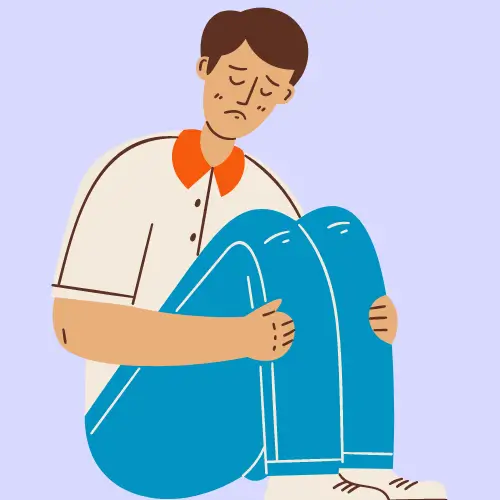-
Online Therapy For Toronto And Throughout Ontario
-
865 York Mills Rd #20, Toronto, ON M3B 1Y6
-
Online Therapy For Toronto And Throughout Ontario
-
865 York Mills Rd #20, Toronto, ON M3B 1Y6
SERVICES
Depression In Teenagers
Teen Depression: Supporting Recovery
Discover how to help your teenager overcome depression, navigate the challenges of adolescence, and find a path to brighter days ahead.
For more information, contact us to book free phone consultation.

Key points
Understand the unique challenges of adolescence and recognize symptoms like sadness, withdrawal, and loss of interest
Genetic predisposition, environmental stressors, psychological factors, and underlying trauma contribute to teen depression
Therapy (including CBT, DBT, and trauma-aware therapy), lifestyle changes, and a supportive home environment can help your teen
Seek support from Sky Therapies to help your teen overcome depression and regain their well-being



Overview
Overview
Depression is a prevalent mood disorder among teenagers. In Canada, almost one in five teenage girls or young women (aged 15 to 24) experienced a major depressive episode in the past 12 months before Covid. (Worldwide, Covid has contributed to a spike in anxiety and depression).
Feelings of depression can disrupt different aspects of your teen’s life, from academic performance to social relationships. With help from Sky Therapies, your teen can overcome depression and regain well-being.
Depression In Teens
Depression In Teens
Teenagers experiencing depression often face unique challenges related to their developmental stage. Adolescence is a period of rapid physical, emotional, and social changes, making teens more vulnerable to mood disorders.
The stigma surrounding mental health issues may deter parents and teens from seeking help, exacerbating their symptoms and prolonging their suffering.
Parents Can Recognize
Parents Can Recognize Depression In Teenagers
As a parent, you can play a crucial role in identifying depression in your teen. Observing changes in their behavior, mood, or academic performance can provide valuable insights into their mental health. Depression in teens can present with different symptoms.
Symptoms Of Depression
Identify Symptoms Of Depression In Your Teen
These symptoms may include:
- Persistent sadness: Teens experiencing depression often feel overwhelmed by feelings of sadness or hopelessness that persist over an extended period of time. This pervasive sense of despair can color their outlook on life and make it challenging to find joy in everyday activities.
- Low motivation: A hallmark of depression is a profound lack of motivation. Teens may struggle to muster the energy to complete even simple tasks, like schoolwork or chores.
- Fatigue: Despite getting an adequate amount of sleep, people with depression often experience persistent fatigue or lethargy. This pervasive sense of tiredness can make it difficult to concentrate in school, participate in extracurricular activities, or engage with peers.
- Changes in appetite or weight: Depression can disrupt your teen’s eating habits, leading to significant changes in appetite and weight. Some may experience a loss of appetite, resulting in weight loss, while others may turn to food for comfort, leading to weight gain.
- Withdrawal from social interactions: Depression often leads to social withdrawal, as teens may feel disconnected from their peers or unable to relate to others. They may avoid social gatherings, isolate themselves in their room, or spend an excessive amount of time online.
- Loss of interest in previously enjoyable activities: Teens with depression may lose interest in hobbies, sports, or socializing with friends. This loss of pleasure can further exacerbate feelings of isolation, loneliness, and loss of self.
- Difficulty concentrating: Depression can impair cognitive functioning, making it challenging for your teen to concentrate, remember information, or make decisions. This brain fog can affect academic performance and exacerbate feelings of inadequacy or failure.
It’s important to note that not all teens will exhibit every symptom of depression, and symptoms may vary in intensity and duration. However, recognizing these signs early on and seeking professional help can greatly improve outcomes and facilitate the journey toward healing and recovery.
Causes And Risk Factors
Causes And Risk Factors For Teen Depression
The development of depression is influenced by an interplay of genetic, environmental, and psychological factors. These may include:
- Genetics: Our genes play a significant role in predisposing individuals to depression. People with a family history of depression are at a higher risk of developing the disorder themselves.
- Environment: External factors such as stressful life events can trigger or exacerbate depression in teens. Academic pressure, family conflicts, peer rejection, or the loss of a loved one can all contribute to feelings of sadness, hopelessness, and despair. The transition from adolescence to adulthood itself can be a stressful period, marked by physical changes, social challenges, and academic expectations.
- Psychological factors: Certain psychological factors can also contribute to the development of depression. Negative thought patterns, low self-esteem, perfectionism, and maladaptive coping mechanisms can all contribute to the onset or maintenance of depressive symptoms.
- Underlying trauma: Issues such as trauma, abuse, or unresolved emotional challenges can significantly contribute to the onset of depression. It’s also important to understand that depression symptoms may often conceal deeper underlying trauma or emotional distress.
It’s essential to recognize that depression in teens often emerges from a complex interaction of biological, psychological, and environmental factors. Sky Therapies can help you and your teenager understand the underlying causes of their depression and address them in a supportive and gentle environment.
Treatment
Treatment
Treatment for depression often involves a combination of therapy, medication, and lifestyle changes. Cognitive-behavioral therapy (CBT), Dialectical Behavior Therapy (DBT), and other forms of psychotherapy can help your teen develop coping skills and address negative thought patterns.
In cases where trauma underlies depression, trauma-focused therapy, EMDR (Eye Movement Desensitization and Reprocessing), or other methods may be recommended to process and heal from past experiences.
In addition, it is important for you to provide open communication, active listening, and a supportive environment at home. This can encourage your teen to express their feelings and seek help when needed.
Reach Out
Reach Out
If you’re worried about your teenager, reach out to Sky Therapies for support and guidance. We can help your teen take the first step toward recovery and a brighter future.


